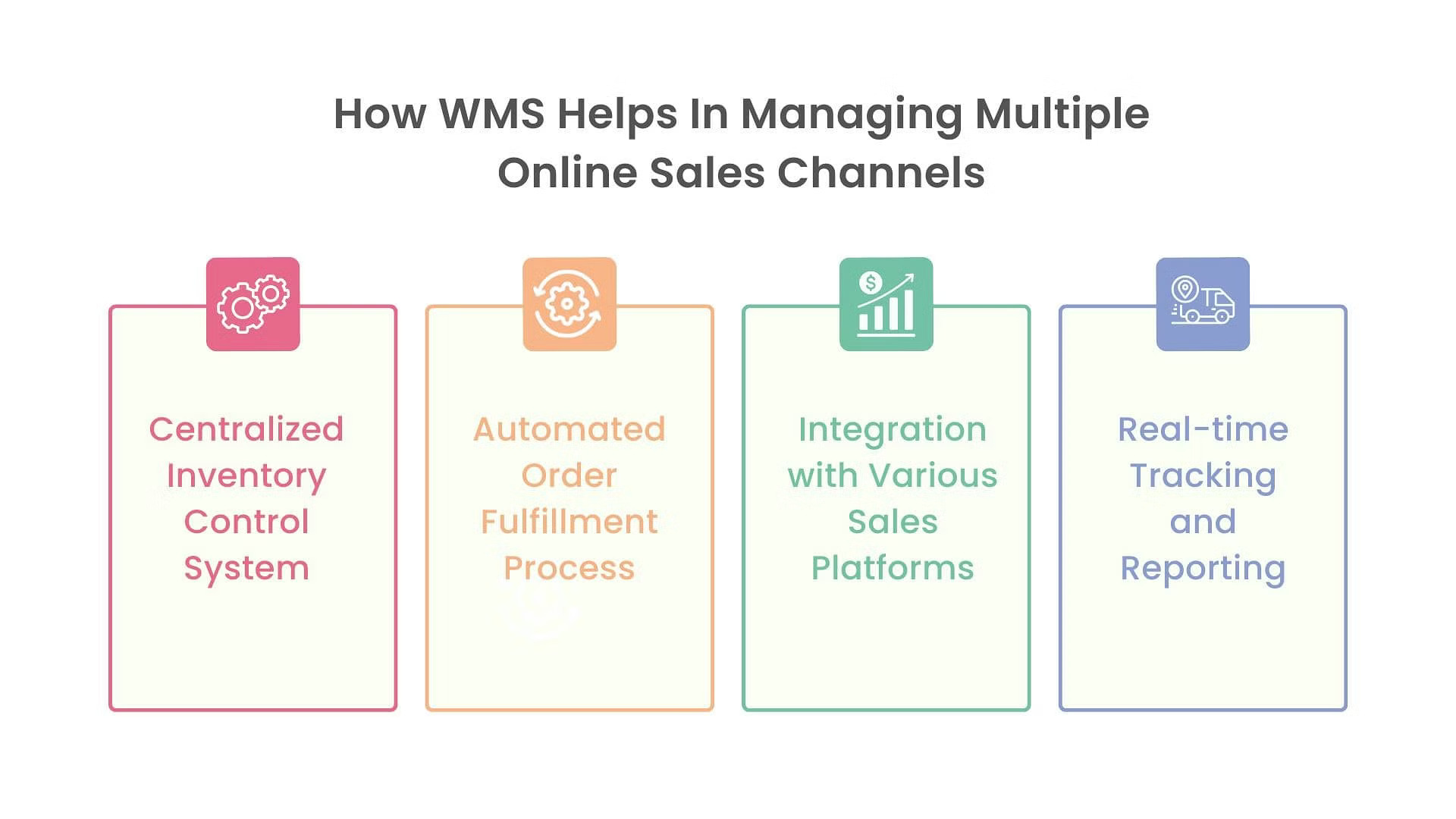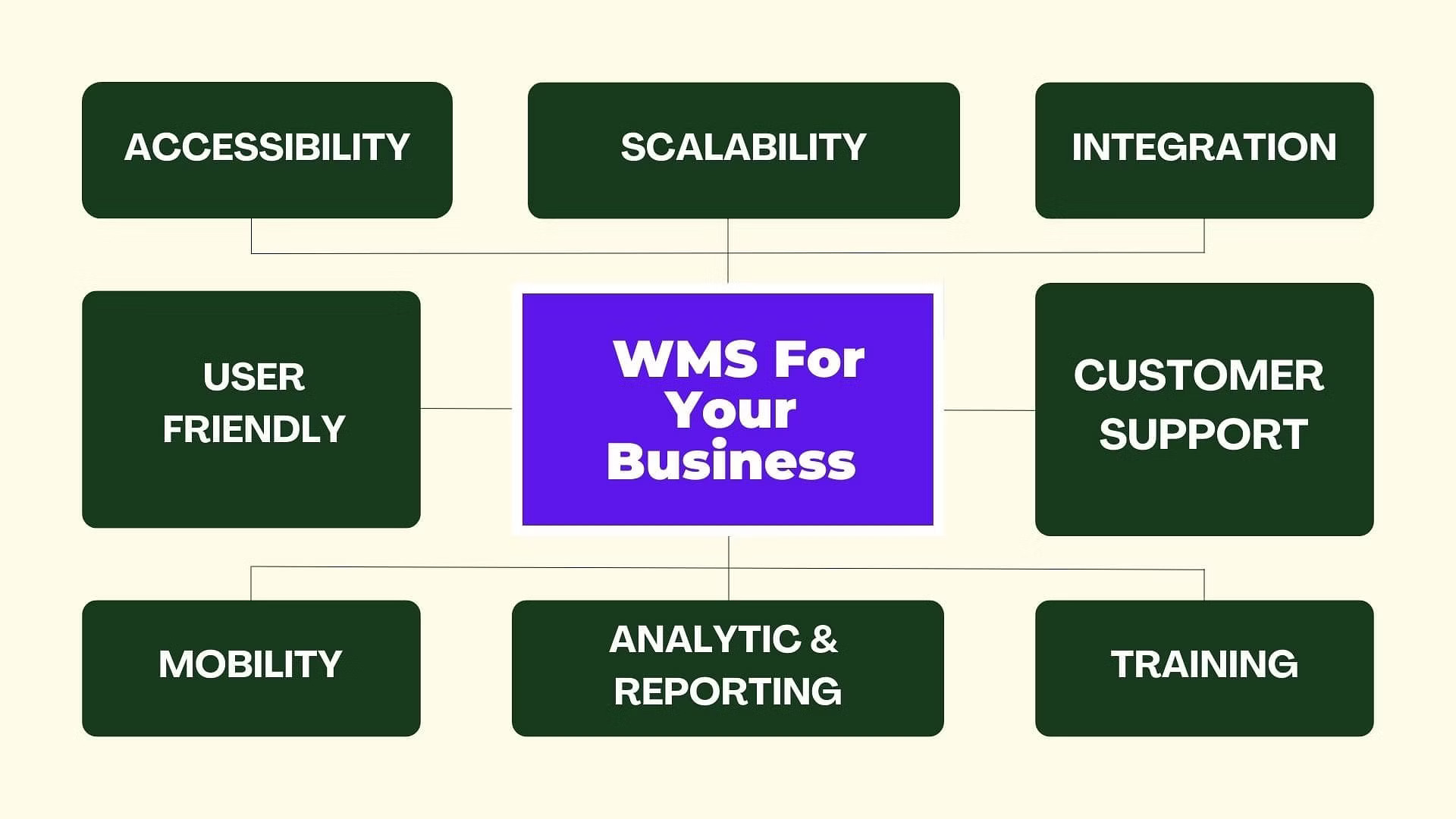WMS With Multiple Online Sales Channels And Its Benefits
Businesses often strive to streamline operations and maximize profit. Managing multiple online sales channels effectively is not an easy task. If you are looking for a solution, we have it for you. Warehouse Management Systems makes it easy for businesses to handle this complex task hassle-free.
Warehouse Management System is a software solution designed to assist businesses in overseeing inventory, orders, and fulfillment across various online sales channels. By giving businesses real-time visibility and control over their inventory, WMSs allow businesses to streamline operations while creating an enjoyable customer experience.
Here we will highlight the advantages of employing a Warehouse Management System to assist your venture in today’s highly-competitive landscape. Let’s get going.
How WMS Helps In Managing Multiple Online Sales Channels
Managing multiple online sales channels can be an arduous endeavor, but using a Warehouse Management System (WMS) to assist can make this task far simpler and more efficient. Here are a few ways WMS can aid with multiple-channel management:

Centralized Inventory Control System:
One of the greatest challenges associated with managing multiple online sales channels is keeping track of inventory across them all. A Warehouse Management System (WMS) makes this task simpler by centralizing inventory data in real-time for easy viewing. You get real-time inventory levels, product availability and locations – helping prevent overselling while expediting order fulfilment promptly.
Automated order fulfillment process:
Order processing across multiple sales channels can be time-consuming and error-prone, which makes WMSs invaluable tools in streamlining the order fulfillment process, cutting manual work time down significantly while improving order accuracy.
Integration with various sales platforms:
WMS with multichannel sales integrate with various sales platforms, such as e-commerce websites, marketplaces and shopping carts, for seamless synchronization of product listings, inventory levels and order data – meaning no manual data entry and guaranteeing all your channels remain up to date at all times.
Real-time Tracking and Reporting:
With a WMS, it’s possible to easily keep an eye on orders and shipments in real-time, providing visibility of each order, any bottlenecks or delays encountered, and ways to address issues quickly and proactively. Furthermore, this system offers comprehensive reporting capabilities giving insight into sales performance metrics, inventory turnover rates, and order fulfillment metrics across various online sales channels.
Struggling to manage multiple sales channels effectively? Discover the solution with our WMS designed for seamless management across multiple online platforms. Connect with our experts to learn more!
Benefits Of Using WMS For Managing Multiple Online Sales Channels
Here are four advantages of employing a WMS for managing multiple online sales channels:
Improved Efficiency and Accuracy:
One of the primary advantages of employing a Warehouse Management System (WMS) is increased efficiency and accuracy during warehouse operations. Using WMS allows businesses to automate various processes like order picking, packing and shipping in real-time without manual intervention, which reduces errors while improving overall efficiency. Furthermore, WMSs offer real-time inventory visibility allowing businesses to track stock levels accurately without overselling or stockouts occurring.
Decreased Order Processing and Fulfilment Time:
Another of the many advantages of employing a WMS is reduced order processing and fulfilment time. A WMS streamlines all aspects of order fulfilment from receiving to picking, packing and shipping; by automating these processes, businesses can significantly decrease how long it takes them to process and fill orders resulting in faster delivery times and higher customer satisfaction ratings.
Enhancing Customer Experience:
WMSs play an instrumental role in optimizing the customer experience by providing real-time inventory visibility and accurate order processing to businesses that enable them to ensure they have enough stock available quickly for order fulfillment, thus decreasing backorders or delayed shipments resulting in happier customers. In addition, they allow businesses to provide accurate tracking information so customers can monitor the status of their orders while staying updated about delivery statuses.
Cost Savings and Increased Profitability:
Implementation of a Warehouse Management System can bring significant cost savings and increased profitability to any organization. By automating warehouse processes and increasing efficiency, companies can reduce labor costs associated with manual tasks; additionally, this software optimizes inventory control to minimize excessive safety stock or overstocking, which reduces carrying costs as well as obsolescence risk; the result is improved efficiency and reduced costs, customer satisfaction increases as businesses can achieve increased profit potential through this WMS investment.
Tips For Choosing The Right WMS For Your Business
Here are a few guidelines to assist in making the optimal choice for your business:

Access Your Needs
Before looking at different WMS options, take some time to carefully consider your business requirements. Think about factors like warehouse size and capacity as well as any specific features required – these will all help narrow down your selections so that the systems chosen meet them exactly.
Consider Scalability
As your business expands quickly, selecting a WMS that can keep pace is of critical importance to its future success. A good system should have enough capacity to accommodate higher inventory levels as your inventory levels expand, as well as new users joining. Scalability will save both money and hassle later down the line when upgrading or switching systems altogether.
Integration Capabilities
WMS should seamlessly integrate with existing systems such as enterprise resource planning (ERP) software or order management system (OMS). This integration ensures seamless data flow among these different systems and reduces risks while increasing overall efficiency – so make sure the WMS you select fits into your current software stack seamlessly.
User-Friendly Interface
The user-friendliness of the WMS interface is vital to its adoption and efficient usage, which will save time and resources over the course of its usage. Choose one with intuitive navigation features with clear instructions for use that requires minimum training – this will lead to quicker adoption rates as well.
Mobile Access
To stay competitive in today’s fast-paced business world, having mobile accessibility to your warehouse management system (WMS) is of great benefit. Look for one which enables mobile management via smartphones or tablets and monitors your warehouse operations from wherever necessary – providing increased productivity and responsiveness for you and your operation alike.
Analytic and Reporting Solutions (ARAs and RARs)
Data analytics and reporting features are crucial in making informed business decisions. Be sure to select a WMS with comprehensive analytics features, so you can track key performance indicators (KPIs), identify bottlenecks, optimize warehouse operations, and gain real-time visibility into inventory levels, order statuses, and fulfillment metrics for optimal warehouse management.
Customer Assistance and Training
Implementing a WMS can be an intimidating and complex process, so selecting an excellent provider with excellent customer support and training services. Look for vendors offering comprehensive training programs as well as ongoing support to ensure an easy transition and continuous system optimization. Excellent customer support can make a big difference when selecting vendors to implement WMSs successfully.
Final Thoughts
As previously outlined, businesses looking to streamline operations and maximize efficiency must possess an in-depth knowledge of WMS (Warehouse Management System) integrated with various online sales channels. WMS with multichannel sales enables businesses to effectively track inventory, orders, shipments and customer satisfaction while assuring timely deliveries and satisfaction for customer orders and shipments. Implementation of WMS can offer businesses numerous advantages, including improved inventory accuracy, faster order fulfilment speed and reduced costs as well as an enhanced customer experience. So, why miss out? Get Connected with Experts at Silent Infotech!

| About Author
Rajesh R
A seasoned IT Integrations and ERP Solution Architect boasts over a decade's expertise in revolutionizing business processes through cloud-based ERP and MIS software solutions. Proficient in leveraging avant-garde technologies such as Blockchain, Al, IoT, etc in crafting bespoke software solutions. His extensive background encompasses tailor-made software solutions across diverse industries like Sales, Manufacturing, Food Processing, Warehouse Operations→ and B2B Businesses. Rajesh excels in engineering and deploying enterprise-grade business software, playing a pivotal role in Business Solution Consulting and designing intricate software solution architectures for many Fortune 500 enterprises.
Schedule Consultation with Rajesh Schedule Now